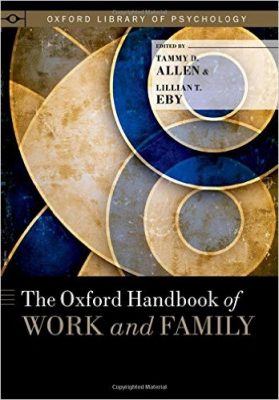 Editors: Tammy D. Allen, PhD; and Lillian T. Eby, PhD
Editors: Tammy D. Allen, PhD; and Lillian T. Eby, PhD
Publisher: Oxford University Press – 502 pages
Book Review by: Paiso Jamakar
Today’s work-family issues are examined in this book from a number of different perspectives in this insightful book. Where has the field of psychology covering such issues been? Where is it headed? These are among questions this text looks at. The editors and the authors of the chapters in this volume review problems and offer solutions, including ways to move research and practice in this field into new and necessary directions.
The editors – Tammy D. Allen and Lillian T. Eby – provide comprehensive overviews of various aspects of work-family psychology that are also interdisciplinary, cross-cultural, and cross-national in nature, through specialists in this field from a number of countries.
Seventy-four people including the two editors named above, mainly from the United States, as well as from seven other nations – Canada, France, Germany, Netherlands, Singapore, Spain, and Switzerland – authored the 35 chapters of this book that are organized around these seven Parts:
- Part One: Introduction and Overview
- Part Two: The Worker
- Part Three: The Family
- Part Four: Organizational Practice
- Part Five: Local, National, and International Context
- Part Six: Special Topics
- Part Seven: Integration and Future Directions
This book includes reviews of a number of under-studied groups. It also looks at how technology is a significant element in the work-family relationship; how neuroscience is helping us better understand work-family issues, the ways in which work-family scholarship and practice can be enhanced, and how social media can help effectively disseminate research findings in this area.
The chapters deal with numerous topics, among them:
- Advancing work-family research
- Boundary management
- Challenges and supports for employed parents of special-needs children and youth
- Child outcomes associated with parent work-family experiences
- Communicating work-family research beyond academia for thought leadership, impact
- Considering Under-represented populations in work and family research
- Couple dynamics
- Cross-national work-life research\
- Emotion regulation at work and at home
- Gender and the work-family domain
- Impact of national policy on work-life experiences\
- Inside organizations: work-life issues from a practice perspective
- Measurement and methodological approaches to the study of work and family
- Neuroscience perspective of the work-family-life interface
- Old and new trends in crossover research
- Personality and values in the work-family experience
- Recovery and the work-family interface
- Role of technology in managing the work and non-work interface
- Theoretical approaches to the study of work and family
- Timeline of the evolution of work-family research
- Work and family in times of crisis
- Work, family, and employee health
- Work-family issues in family business
- Work-family practice in multinational organizations
The chapters reflect superb organization and presentation of materials. Among the common elements in the chapters are (in order of layout):
- Abstract
- Key Words
- Introduction
- Discussions in topics
- Discussions in subtopics
- Future Directions
- Conclusions
- References
The Oxford Handbook of Work and Family is an outstanding resource on work-family matters. It covers a lot of ground in this area of psychology; is authoritative in that it provides the viewpoints of so many specialists; is well organized enabling easy learning and good understanding of subject matter and easier recall of important points for the student as well as the practitioner in this field. We highly recommend the use of this book for study and reference.
Editors:
Tammy D. Allen, PhD is Professor of Psychology and Director of the Industrial Organizational Psychology doctoral training program at the University of South Florida in Tampa. She is a Fellow of the Society for Industrial and Organizational Psychology (and its 2013-2014 President), the Association for Psychological Science, and the American Psychological Association.
Her research centers on work-family issues, career development, and employee wellbeing from both individual and organizational perspectives. She is the author of over 100 peer-reviewed publications and four books. Her body of scholarship has received multiple awards and accrued over 15,000 citations. Dr. Allen is past Associate Editor of the Journal of Applied Psychology and the Journal of Occupational Health Psychology, and current Associate Editor of the Journal of Business and Psychology. She has served on the editorial boards of a variety of journals.
Lillian T. Eby is Professor of Psychology and Director of the Owens Institute for Behavioral Research at the University of Georgia (UGA) in Athens. She is a Fellow of the Society for Industrial and Organizational Psychology and the American Psychological Association.
Her research focuses on relationships at work, career issues, and occupational health psychology. She is the author of over 90 peer-reviewed publications and two edited books. She has garnered numerous awards over her career, both within the Academy and at UGA. Dr. Eby is past Associate Editor of Personnel Psychology and current Associate Editor of the Journal of Applied Psychology. In addition to her faculty position in the I-O program she is currently the Director of the Owens Institute for Behavioral Research at UGA.







